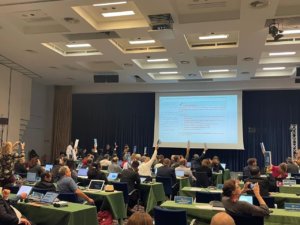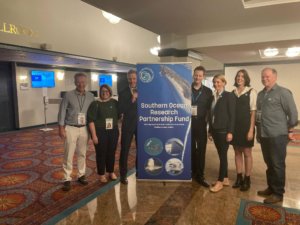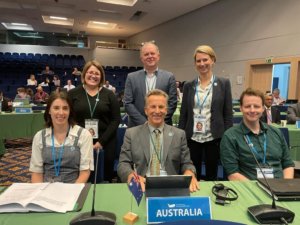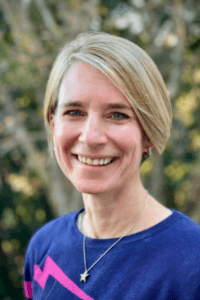IWC68 has now ended. As usual, it had many ups and downs…
Signs of Positive Progress
One of the main highlights of the meeting was the adoption by consensus of the marine plastics pollution resolution. The unanimous support makes it clear that this issue, which has a significant impact on the world’s whales and dolphins, is a priority issue for all countries. It is fantastic that action on plastic pollution can now be formally supported by the Commission, tying in with work that is underway globally to tackle this pervasive problem.
 At this meeting one of the critical issues was the organisation’s budget (for 2023-24). A decision was needed to avoid the IWC facing insolvency, and potential collapse of the structure which ensures the global whaling moratorium is maintained. The budget process was led by a hard-working team from Australia, who in the past few years have been tirelessly working to come up with a number of palatable options for governments to consider, as well as a longer term reform strategy. Much debate was held to refine possible options. Thankfully, on the final day, a revised budget option was passed by the only vote of the meeting, together with a budget reform strategy to guide the budget process going forwards. Sadly this will involve some cuts to the Secretariat and the Scientific Committee, which will impact their work.
At this meeting one of the critical issues was the organisation’s budget (for 2023-24). A decision was needed to avoid the IWC facing insolvency, and potential collapse of the structure which ensures the global whaling moratorium is maintained. The budget process was led by a hard-working team from Australia, who in the past few years have been tirelessly working to come up with a number of palatable options for governments to consider, as well as a longer term reform strategy. Much debate was held to refine possible options. Thankfully, on the final day, a revised budget option was passed by the only vote of the meeting, together with a budget reform strategy to guide the budget process going forwards. Sadly this will involve some cuts to the Secretariat and the Scientific Committee, which will impact their work.
In addition, important structural changes to the Commission and future meetings structures were agreed. Whilst these aren’t as ambitious as proposed, and don’t include the development of a strategic plan, they are small steps forward nonetheless and further work will be done to agree the details over the next two years.
 A significant body of ongoing work was presented by the Scientific and Conservation Committees and the Commission agreed that this should continue. This critical work involves hundreds of scientists, tackling an extensive range of threats facing whales and dolphins, from climate change through to bycatch in fisheries. It also considers whale welfare and a tool to assess it, alongside processes to tackle conservation threats for species at imminent risk of extinction. It was great to see this detailed, yet critical, work be approved and we look forward to seeing continued progress.
A significant body of ongoing work was presented by the Scientific and Conservation Committees and the Commission agreed that this should continue. This critical work involves hundreds of scientists, tackling an extensive range of threats facing whales and dolphins, from climate change through to bycatch in fisheries. It also considers whale welfare and a tool to assess it, alongside processes to tackle conservation threats for species at imminent risk of extinction. It was great to see this detailed, yet critical, work be approved and we look forward to seeing continued progress.
Challenges
Whilst Japan’s strategy appears to be ‘taking a back seat’ – which is welcome given that this was its first meeting as a non member after it left in 2019 – there is no doubt that their influence continues. Moreover, Japan’s departure has sadly not led to the end of game-playing at IWC; 17 pro-whaling countries walked out of the meeting on Thursday, after they sought (and failed) to get assurance that the proponents of the South Atlantic Whale Sanctuary would not bring their proposal to a vote. This proposal has come to IWC meetings for more than 10 years, and this year it finally looked like it had the required three-quarter majority of votes required to pass the proposal.
Hopes were high, but with the 17 countries walking out of the meeting, the required quorum to make decisions and take votes went too, rendering the meeting shocked and helpless. Some countries challenged the Chair on his interpretation of a quorum, unsuccessfully. Frustration soon morphed to anger, particularly by South American countries, for whom this was a priority at this meeting. Once all countries had returned to the meeting, after it was agreed that no vote could be taken and so the sanctuary proposal would not proceed, proponent countries – Brazil, Argentina and Uruguay – made their frustrations clear. As a result, the Commission agreed that at IWC69 the first order of business will be to discuss the interpretation of quorum, in the hope that we will not find ourselves in this situation again.
Thankfully, two resolutions of major concern, including one to lift the global moratorium on whaling and the second on food security, were not agreed by the Commission, and work will also continue on these intersessionally.
Concluding Thoughts
 IWC68 will no doubt be remembered for the decisions it didn’t make, as much as those it did. Whilst the Commission has been ably guided for an extended period by Andrej Bibic of Slovenia, he has now passed the baton to Vice Chair Amadou Telivel Diallo of the Republic of Guinea. Notably at this meeting we welcomed the nomination of Australia’s IWC Commissioner Dr Nick Gales as the next Vice Chair, who will assume the Chair position in two years time after IWC69.
IWC68 will no doubt be remembered for the decisions it didn’t make, as much as those it did. Whilst the Commission has been ably guided for an extended period by Andrej Bibic of Slovenia, he has now passed the baton to Vice Chair Amadou Telivel Diallo of the Republic of Guinea. Notably at this meeting we welcomed the nomination of Australia’s IWC Commissioner Dr Nick Gales as the next Vice Chair, who will assume the Chair position in two years time after IWC69.
The ability for AMCS to continue to be in the room, and to support the amazing leadership that Australia continues to show, led by Dr Nick Gales, is important. The Australian team is a dedicated group of experts who work year on year to deliver strong conservation outcomes for whales and dolphins, with much of this technical or behind the scenes work that doesn’t get a lot of attention. It was great to be the NGO representative on the Australian delegation to help deliver these important conservation outcomes, which we hope will continue with the election of Dr Nick Gales as Vice-Chair.
As the sun sets on IWC68 in Slovenia, it is clear there is certainly much to be done before IWC69, which will be held in Lima, Peru in 2024.

Alexia Wellbelove
Campaigns Manager – Fisheries and Threatened Species
